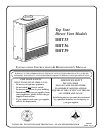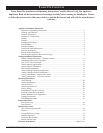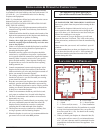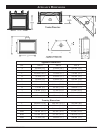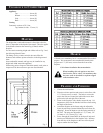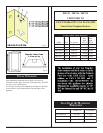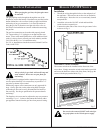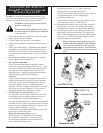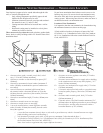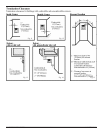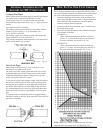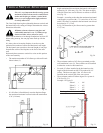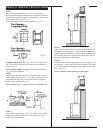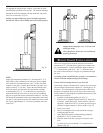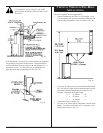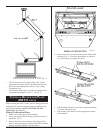
10002789/0 -3- DBT33/DBT36/DBT39
This gas replace should be installed by a qualied installer
in accordance with local building codes and with current CAN
/CGA-B149 (. 1 or .2) Installation codes for Gas Burning
Fireplaces and Equipment.
FOR U.S.A Installations follow local codes and/or the current
National Fuel Gas Code. ANSI Z223.1.
FOR SAFE INSTALLATION AND OPERATION PLEASE
NOTE THE FOLLOWING:
1. This replace gives off high temperatures and should be
located out of high trafc areas and away from furniture
and draperies.
2. Children and adults should be alerted to the hazards of the
high surface temperatures of this replace and should stay
away to avoid burns or ignition of clothing.
3. Caution, due to high glass surface temperature children
should be carefully supervised when they are in the same
room as the replace.
4. Under no circumstances should this replace be modied.
Parts removed for servicing should be replaced prior to
operating the replace again.
5. Installation and any repairs to this replace should be
carried out by a qualied service person. A professional
service person should be contacted to inspect this replace
annually. Make it a practice to have all of your gas re-
places checked annually. More frequent cleaning may
be required due to excess lint and dust from carpeting,
bedding material, etc.
6. Control compartments, burners and air passages in this
replace should be kept clean and free of dust and lint.
Make sure that the gas valve and pilot light are turned off
before you attempt to clean this replace.
7. The venting system (chimney) of this replace should be
checked at least once a year and if needed your venting
system should be cleaned.
8. Keep the area around your replace clear of combustible
materials, gasoline and other ammable vapour and liq-
uids. This replace should not be used as a drying rack for
clothing, nor should Christmas stockings or decorations
be hung on or around the replace.
9. Under no circumstances should any solid fuels (wood,
coal, paper or cardboard etc.) be used in this replace.
10. The ow of combustion and ventilation air must not be
obstructed in any way.
11. When the replace is installed directly on carpeting, vinyl
tile or any combustible material other than wood, the
replace must be installed on a metal or wood panel
extending the full width and depth of the replace.
12. This replace must not be connected to a chimney ue
serving a separate solid fuel burning replace.
13. When the replace is not in use it is recommended that the
gas control valve be left in the OFF position.
This appliance has been approved for
after-market mobile home installations
IMPORTANT:
PLEASE REVIEW THE FOLLOWING CAREFULLY
Remove any plastic from trim parts before turning the re-
place ON.
It is normal for replaces fabricated of steel to give off
some expansion and/or contraction noises during the start
up or cool down cycle. Similar noises are found with your
furnace heat exchanger or car engine.
It is not unusual for your gas replace to give off some
odour the rst time it is burned. This is due to the curing
of the paint and any undetected oil from the manufacturing
process.
Please ensure that your room is well ventilated - open all
windows.
It is recommended that you burn your replace for a least
six (6) hours the rst time you use it. If the optional fan
kit has been installed, place the fan switch in the “OFF”
position during this time.
INSTALLATION & OPERATING INSTRUCTIONS
LOCATING YOUR FIREPLACE
A - Flat on the wall B - Cross Corner
C - * Island D - ** Room Divider
E - ** Flat on wall (in corner) F - Chase Installation
* Island (C) and Room Divider (D) installation is possible
as long as the horizontal portion of the vent system (X)
does not exceed 20' (6.1 m). See details in the venting
section of this manual.
** When you install your replace in a Room divider (D)
or at on the wall in a corner (E), a minimum distance
of 6" (153 mm) clearance must be maintained from the
perpendicular wall and the front of the appliance. See
(Y) in Fig. 1.
Fig. 1



